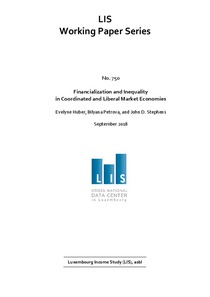Financialization and inequality in coordinated and liberal market economies
"The last three decades have witnessed rising inequality and deepening financialization (however defined) in post-industrial democracies. A rapidly growing body of literature has linked the two phenomena (see e.g. Dünhaupt 2014, Godechot 2016, Flaherty 2015, Roberts and Kwon 2017). Contrary to...
| Main Authors: | , , |
|---|---|
| Institution: | ETUI-European Trade Union Institute |
| Format: | TEXT |
| Language: | English |
| Published: |
Luxembourg
2018
LIS |
| Subjects: | |
| Online Access: | https://www.labourline.org/KENTIKA-19303330124911215129-Financialization-and-inequalit.htm |
| Summary: | "The last three decades have witnessed rising inequality and deepening financialization (however defined) in post-industrial democracies. A rapidly growing body of literature has linked the two phenomena (see e.g. Dünhaupt 2014, Godechot 2016, Flaherty 2015, Roberts and Kwon 2017). Contrary to existing scholarship, which has largely neglected the mediating effect of institutions, we argue that contextual differences play a crucial role in shaping the relationship between financialization and inequality. Drawing on the Varieties of Capitalism literature, we posit that a larger financial sector is associated with a more unequal distribution of income in liberal market economies, where the industry develops substantial autonomy from other actors. In contrast, the stronger position of labor in coordinated market economies is able to counteract the inequality-enhancing effects of financialization. We test these hypotheses with data on 18 and 21 post-industrial democracies between 1960 and 2013. Our analysis is largely consistent with our expectations." |
|---|---|
| Physical Description: | 42 p. Digital |

